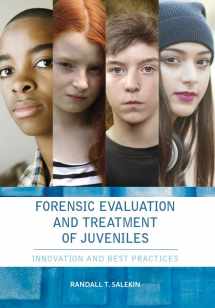
Forensic Evaluation and Treatment of Juveniles: Innovation and Best Practices
Book details
Summary
Description
Psychologists have always played a key role in determining how the juvenile justice system assesses and treats young offenders. Recent neuropsychological findings shows that there are important developmental differences between juvenile offenders, such as varying levels of maturity, risk potential, and amenability to treatment, not to mention individualized personality traits and possible mental disorders. Psychologists must therefore strive for targeted rehabilitation services to avoid unfair treatment and redirect youth to healthier life choices.
This book provides forensic clinicians with practical strategies for evaluating juvenile offenders and seeking individualized rehabilitation services that will redirect youth to healthier life choices. It highlights five broad areas of juvenile assessment that are essential to any evaluation: veracity in reporting, personality and pathology, risk for dangerous behavior, developmental maturity, and treatment amenability. Readers will also learn how to present assessment data to judges in a thorough and understandable manner while also accounting for local laws and the political climate.


We would LOVE it if you could help us and other readers by reviewing the book
Book review



